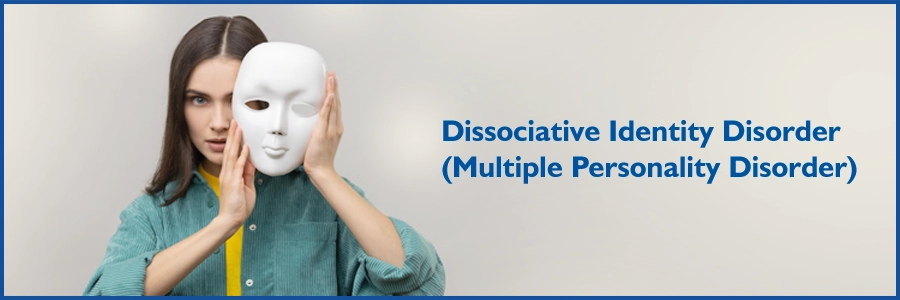- Cardiology 84
- Dermatology 45
- Endocrinology 33
- ENT 16
- Fertility 190
- Gastroenterology 78
- General-Medicine 81
- Gynecology 80
- Hematology 19
- Infectious-Diseases 33
- Neurology 52
- Oncology 34
- Ophthalmology 23
- Orthopedics 69
- Pediatrics 31
- Procedure 23
- Public-Health 144
- Pulmonology 59
- Radiology 8
- Urology 68
- Wellness 161
- Woman-and-child 77

Understanding Multiple Personality Disorder
Yes, it’s possible! This condition is called Dissociative Identity Disorder (DID), previously known as Multiple Personality Disorder.
People with DID may feel detached from their own experiences and may forget actions or conversations witnessed by others. The resulting memory gaps, confusion, and stress from experiencing "not-me" moments can be overwhelming.
What is Dissociative Identity Disorder (DID)?
Dissociative Identity Disorder (DID), formerly known as Multiple Personality Disorder, is a complex mental health condition where an individual has two or more distinct personalities or identities. Each personality may have its own name, age, history, and characteristics. DID often results in significant memory gaps and emotional detachment, causing stress and confusion.
Secure your health with a second opinion. Make informed decisions and book your appointment today!
Get A Second OpinionDifferent Types of Dissociative Identity Disorder
Dissociative Identity Disorder is one type of dissociative disorder, but there are other related conditions:
- Depersonalization Disorder: Also known as Derealization Disorder, this condition involves feeling detached from one’s own body or surroundings.
- Dissociative Amnesia: Characterized by an inability to recall important personal information, typically following a traumatic event.
Multiple Personality Disorder Symptoms
Individuals with DID experience various symptoms, including:
- Memory loss or gaps
- Delusions
- Depression
- Disorientation
- Anxiety
- Suicidal thoughts or self-harm
- Substance abuse (drugs or alcohol)
Ready to take control of your health journey? Book your appointment now and start your path towards wellness today!
Book an AppointmentWhat Causes Dissociative Identity Disorder?
DID is often linked to severe trauma or abuse during childhood, such as physical abuse or severe emotional stress. It serves as a coping mechanism, allowing individuals to distance themselves from painful experiences.
Multiple Personality Disorder Treatment
While there is no cure for DID, treatment can help manage symptoms effectively. The main approaches include:
- Psychotherapy: The most effective treatment, focusing on addressing past trauma, managing behavior changes, and integrating the multiple identities into one.
- Medication: May be prescribed to address symptoms like depression or anxiety.
Can DID Be Cured?
There is no cure for DID, but early diagnosis and treatment can help control symptoms and improve quality of life. Treatment often involves identifying triggers, such as stress and substance abuse, and managing them effectively.
Diagnosing Dissociative Identity Disorder
No specific test exists for diagnosing DID. Doctors assess symptoms and personal history, ruling out other medical conditions through various tests.
Living with DID
A strong support system is crucial for managing DID. Engaging with healthcare providers, family, and friends can make living with DID more manageable. Open communication and seeking support are vital for coping with the condition.
Age of Onset and Risk Factors
DID typically begins between ages 5 and 10, often going unnoticed due to the natural behavior of childhood play. Children who experience long-term abuse are at higher risk of developing DID.
When to seek help
If you or a loved one shows symptoms of DID, consider consulting a mental health professional. At Medicover Hospitals, we have expert psychiatrists ready to help. Learn more about our services and schedule an appointment today!
Frequently Asked Questions
A person with Dissociative Identity Disorder (DID) may experience two or more separate personalities or identities. DID is a complex psychological disease. These identities may have their own way of perceiving and interacting with the world.
The exact cause of DID is not fully understood, but it's thought to emerge as a coping strategy after intense trauma, such as childhood abuse, neglect, or other overwhelming life events.
A comprehensive psychiatric evaluation conducted by a licensed mental health practitioner, such as a psychologist or psychiatrist, is necessary for the diagnosis. The Diagnostic and Statistical Manual of Mental Disorders (DSM-5) criteria are applied in order to evaluate symptoms and exclude alternative diagnoses.
DID is considered relatively rare, but its prevalence is debated among experts. It is estimated to affect around 1-3% of the general population, although rates may vary based on diagnostic practices and cultural factors.
DID typically develops in response to severe trauma experienced during childhood, often before the age of 9. Trauma disrupts the normal development of identity and leads to dissociative symptoms as a coping mechanism.
Individuals with DID can lead functional lives, but the disorder can cause significant distress and impairment in social, occupational, or other areas of functioning. Treatment can help manage symptoms and improve quality of life.
Alters are distinct identities or personality states within a person with DID. Each alter may have its own name, age, gender, mannerisms, memories, and personal history. Switching between alters can be triggered by stress or reminders of traumatic events.
While there is no cure for DID, treatment can help individuals manage symptoms, improve functioning, and work towards integration of identities. Treatment outcomes vary, and long-term therapy may be necessary.

- Cardiology 2132
- Dermatology 168
- Endocrinology 135
- ENT 97
- Fertility 217
- Gastroenterology 232
- General 478
- General-Medicine 1685
- Gynecology 169
- Hematology 85
- Infectious-Diseases 208
- Neurology 207
- Oncology 345
- Ophthalmology 65
- Orthopedics 187
- Pediatrics 83
- Procedure 72
- Public-Health 209
- Pulmonology 126
- Radiology 13
- Second Opinion 311
- Urology 294
- Wellness 600
- Woman-and-child 447
- Others 10217
Related Blogs
If you have any questions, please fill out the enquiry form or call us, and we will get back to you promptly.
040-68334455